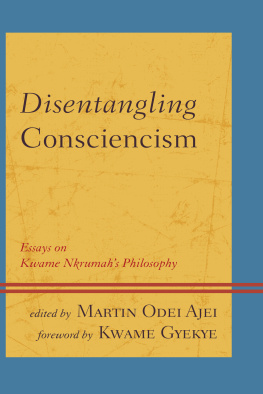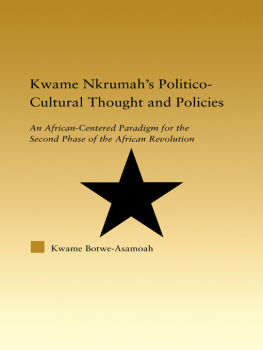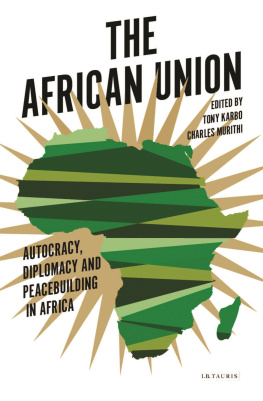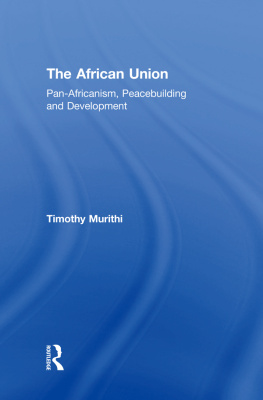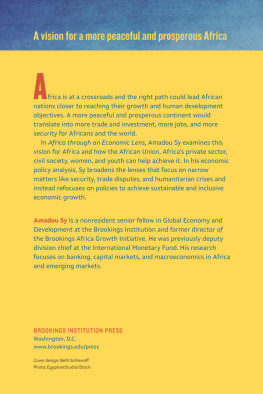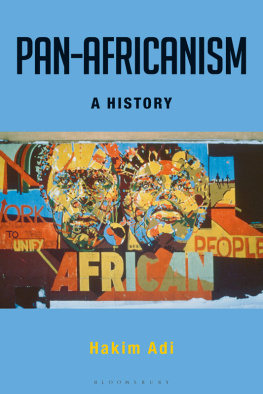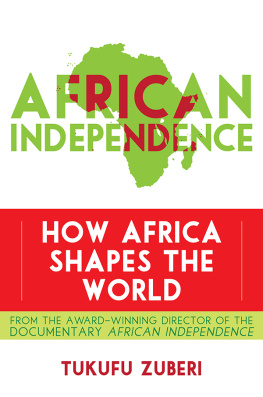The Pan-African Imperative
This book argues that the principles of Pan-Africanism are more important than ever in ensuring the liberation of the people of Africa, those at home and abroad, and the rapid development of the African continent.
The writings and practice of Osagyefo Dr. Kwame Nkrumah, Ghanas first post-independence prime minister and president, were key in laying out a vision for post-independence Africa. Now, in an effort to counter the deluge of neo-liberal thinking that has engulfed so much of the debate on African development in recent decades, Michael Williams illuminates just how important a role an Nkrumaist intellectual framework can play in providing an accurate diagnosis of, and effective solution to, Africas development crisis. This is done by examining Nkrumahs vision of the critical role Pan-Africanism must play in the development of the continent.
Raising vitally important questions about Africas development and the quality of life of its populations, this book will be a key text for researchers of African politics, development studies, and the Pan-African movement.
Michael Williams recently retired from his position as Academic Director and Professor at Webster University (Ghana Campus). He is the founder of The Nkrumaist Review: Pan-African Perspectives on African Affairs, which he edited for ten years.
Routledge African Studies
- Oral Literary Performance in Africa
Beyond Text
Edited by Nduka Otiono and Chiji Akma
- Decolonising Childhoods in Eastern Africa
Literary and Cultural Representations
Oduor Obura
- The De-Africanization of African Art
Towards Post-African Aesthetics
Edited by Denis Ekpo and Pfunzo Sidogi
- BlackArab Encounters in Literature and Film
Touria Khannous
- The Pan-African Imperative
Revisiting Kwame Nkrumahs Vision for African Development
Michael Williams
- Naming and Othering in Africa
Imagining Supremacy and Inferiority through Language
Sambulo Ndlovu
- Memories of Violence in Peru and the Congo
Writing on the Brink
Gilbert Shang Ndi
- Black Thought
A Theory of Articulation
Victor Peterson II
For a full list of available titles please visit: https://www.routledge.com/Routledge-African-Studies/book-series/ROUTAFST
The Pan-African Imperative Revisiting Kwame Nkrumahs Vision for African Development
Michael Williams

First published 2022
by Routledge
2 Park Square, Milton Park, Abingdon, Oxon OX14 4RN
and by Routledge
605 Third Avenue, New York, NY 10158
Routledge is an imprint of the Taylor & Francis Group, an Informa business
2022 Michael Williams
The right of Michael Williams to be identified as author of this work has been asserted in accordance with sections 77 and 78 of the Copyright, Designs and Patents Act 1988.
All rights reserved. No part of this book may be reprinted or reproduced or utilised in any form or by any electronic, mechanical, or other means, now known or hereafter invented, including photocopying and recording, or in any information storage or retrieval system, without permission in writing from the publishers.
Trademark notice: Product or corporate names may be trademarks or registered trademarks, and are used only for identification and explanation without intent to infringe.
British Library Cataloguing-in-Publication Data
A catalogue record for this book is available from the British Library
Library of Congress Cataloging-in-Publication Data
Names: Williams, Michael (Economist), author.
Title: The Pan-African imperative : revisiting Kwame Nkrumah's vision for
African development / Michael Williams.
Description: 1 Edition. | New York, NY : Routledge, 2022. |
Series: Routledge african studies |
Includes bibliographical references and index. |
Identifiers: LCCN 2021033694 (print) | LCCN 2021033695 (ebook) |
ISBN 9781032125183 (hardback) | ISBN 9781032125206 (paperback) |
ISBN 9781003224990 (ebook)
Subjects: LCSH: Nkrumah, Kwame, 19091972. | Economic developmentAfrica. |
SocialismAfrica. | AfricaPolitics and government. |
Pan-Africanism.
Classification: LCC HC800 .W55 2022 (print) |
LCC HC800 (ebook) | DDC338.96dc23
LC record available at https://lccn.loc.gov/2021033694
LC ebook record available at https://lccn.loc.gov/2021033695
ISBN: 978-1-032-12518-3 (hbk)
ISBN: 978-1-032-12520-6 (pbk)
ISBN: 978-1-003-22499-0 (ebk)
Typeset in Times New Roman
by Newgen Publishing UK
Dedicated to Kwame Ture,
Pan-Africanist par excellence,
whose interpretation of Nkrumaism
during the last quarter of the twentieth century,
in theory and in practice, remains the Gold Standard
all revolutionary Pan-Africanists should aspire to emulate.
Contents
- Acknowledgements
- Introduction
- Historical evolution of Pan-Africanism
- Nkrumaism and radical Pan-African thought
- Continental unification as a prerequisite to African development
- Class exploitation and socialist reconstruction in Africa
- Conclusion: political guidelines on achieving a unified socialist Africa
- Select bibliography
- Index
Acknowledgements
Numerous friends and colleagues, to whom I am most grateful, have contributed to the final outcome of this book. Their insightful suggestions and recommendations helped to correct errors, mistakes, shortcomings, and misleading statements that I would not have caught without their input. The errors, mistakes, shortcomings, and misleading statements that remain belong to me. However, I must give special thanks to a number people who read significant portions of the manuscript and whose assistance and support served to improve the manuscript significantly. They include Albie Walls, Nii Ardey Otoo, Mjiba Frehiwot, Nehanda Imara, Doreatha Mbalia, Pa Joof, Ama Biney, Salim Faraji, and Jean-Germain Gros. Helena Hurd, Editor of Global Development and African Studies at Routledge Press, provided excellent suggestions that resulted in considerable improvement of the manuscript. I would also like to acknowledge the profound contribution two of my mentors have made to this work, in particular, and to my understanding of Pan-Africanism in general: Dr. Bill Turner, who first introduced Africa to me when I was a 20-year-old kid and nourished my devotion to Pan-Africanism for years afterwards, and Prof. Kofi Asare Opoku, who has helped me to better understand Africa during my past 27 years of living in Ghana. Finally, the consistent support and encouragement provided by my wife, Afua, continues to serve as the foundation upon which I am able to research and write with any degree of competency.
Introduction
DOI: 10.4324/9781003224990-1
Prior to the COVID-19 pandemic, various economic pundits had been lauding the positive economic growth rates of numerous African states.1 This meant very little for those of us living on the ground. What we have been actually experiencing, then and now, is a continent where the quality of life for the vast majority of its people is arduous, at best, harrowing and dreadful, at worst. This, more than anything else, explains why so many ordinary people have been willing to risk everything, including their very lives on the high seas, to escape. What, after all, is the relevance of economic growth without a commensurate improvement in the living standards of ordinary citizens? If economic growth in Africa is unable to translate into greater access to education, higher life expectancy rates, enhanced environmental protection, increased value added to Africas raw materials and mineral resources, enduring peace and security, and a significant improvement in the overall quality of human life, what difference does it really matter?









